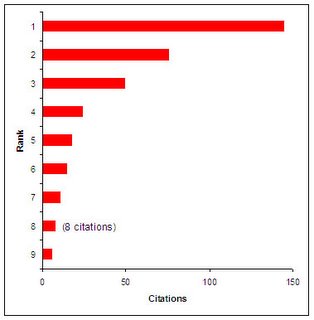What's your h-index?
About a month ago I had a conversation with my thesis advisor about the h-index. It is a new method, proposed by Jorge E. Hirsch of UCSD to quantitatively measure a scientist’s influence. His proposal was published in PNAS and Nature had a little report on it. Here's a publically available link to the paper (for those who don't have institutional access to PNAS).
The Abstract from the original PNAS paper:
And here is the rationale from the paper:
 paper was cited (citation number), and the paper rank where rank=citations, is paper #8.
paper was cited (citation number), and the paper rank where rank=citations, is paper #8.
Benefits of the h-index:
- It is quantitative.
- It takes into account not just the number of publications or how well a couple of publications are cited, but the QUANTITY of well cited publications.
- Older, well established professors will have accumulated many citations for initial work that is still relevant. Thus h-index goes up with time.
- As you increase your h-index number, it becomes harder to increase it further. Take my h-index: all i need to get to h-index=9 is to publish another paper and hope that it gets cited at least 9 times (and that my current #8 gets cited an extra time). So right now my h-index will roughly grow with the number of publications. Eventually as my h-index grows (to say 50), each new paper has to be cited at least as many times (in this example, 51 citations) to boost my h-index.
Problems:
- Self citations. Although this could easily be eliminated.
- Papers which are wrong. This is not so bad. If you are influential, by definition, people will have to confront and address your "bad data" and explain why it is wrong.
- Cross field comparison. Currently biologists have much higher h-indexes than physicists, simply because there are more scientists who study biology (and thus more individuals who can cite you). Even within biology, it looks like researchers studying signal transduction and oncogenes get a boost to their h-index.
Some h-indexes for notable biologists:
Francis Crick: 53
James Watson: 43
Sydney Brenner: 92
George Palade: 105
Keith Porter: 70
Some people in our vicinity ...
Marc Kirschner: 90
Tim Mitchison: 59
Tom Rapoport: 60
John Blenis: 64
Joan Brugge: 67
Tom Maniatis: 115
Lew Cantley: 97
Steve Harrison: 74
Jack Szostak: 63
other big guys ...
Gunter Blobel: 120
James Rothman: 92
Randy Schekman: 76
Ian Mattaj: 65
Rudolf Jaenisch: 96
Elaine Fuchs: 93
Richard Hynes: 94
Michael Sheetz: 65
Ron Vale: 56
Bert Vogelstein: 143
Bob Weinberg: 113
Susan Lindquist: 74
Harold Varmus: 103
Michael Bishop: 112
Phil Sharp: 115
Joan Steitz: 91
Tom Steitz: 85
Thomas Cech: 82
Alexander Varshavsky: 62
Eric Kandel: 117
Richard Axel: 80
Paul Nurse: 90
Lee Hartwell: 61
One problem with these lists ... we did the searches on ISI, but could not account for papers where the middle initial was omited so the true values for some researchers may be slightly higher ...
OK I've wasted enough time. I'll end with this quote from Hirsch's PNAS paper:
But of course this is all bxxl sxxt ...
{Update 1/28/06}
Acme Scientist informs me that Michael Behe's h-index is 15 ... interesting. Someone should compile the h-index of all these so-called experts ...
The Abstract from the original PNAS paper:
I propose the index h, defined as the number of papers with citation number is [equal or greater than] h, as a useful index to characterize the scientific output of a researcher.
And here is the rationale from the paper:
Why would you try to quantitatively measure a scientist’s influence? For the few scientists who earn a Nobel prize, the impact and relevance of their research is unquestionable. Among the rest of us, how does one quantify the cumulative impact and relevance of an individual's scientific research output? In a world of limited resources, such quantification (even if potentially distasteful) is often needed for evaluation and comparison purposes (e.g., for university faculty recruitment and advancement, award of grants, etc.).So what is my h-index? To find out log into Thomson Scientific's ISI Web of knowledge, find all your papers and sort them based on citations. Scroll down the list until your paper rank is equal or greater than the citations for that paper. In my puny grad-student/postdoc career, I’ve only published 9 peer-reviewed papers. What follows is a bar graph of the number of times each
 paper was cited (citation number), and the paper rank where rank=citations, is paper #8.
paper was cited (citation number), and the paper rank where rank=citations, is paper #8.Benefits of the h-index:
- It is quantitative.
- It takes into account not just the number of publications or how well a couple of publications are cited, but the QUANTITY of well cited publications.
- Older, well established professors will have accumulated many citations for initial work that is still relevant. Thus h-index goes up with time.
- As you increase your h-index number, it becomes harder to increase it further. Take my h-index: all i need to get to h-index=9 is to publish another paper and hope that it gets cited at least 9 times (and that my current #8 gets cited an extra time). So right now my h-index will roughly grow with the number of publications. Eventually as my h-index grows (to say 50), each new paper has to be cited at least as many times (in this example, 51 citations) to boost my h-index.
Problems:
- Self citations. Although this could easily be eliminated.
- Papers which are wrong. This is not so bad. If you are influential, by definition, people will have to confront and address your "bad data" and explain why it is wrong.
- Cross field comparison. Currently biologists have much higher h-indexes than physicists, simply because there are more scientists who study biology (and thus more individuals who can cite you). Even within biology, it looks like researchers studying signal transduction and oncogenes get a boost to their h-index.
Some h-indexes for notable biologists:
Francis Crick: 53
James Watson: 43
Sydney Brenner: 92
George Palade: 105
Keith Porter: 70
Some people in our vicinity ...
Marc Kirschner: 90
Tim Mitchison: 59
Tom Rapoport: 60
John Blenis: 64
Joan Brugge: 67
Tom Maniatis: 115
Lew Cantley: 97
Steve Harrison: 74
Jack Szostak: 63
other big guys ...
Gunter Blobel: 120
James Rothman: 92
Randy Schekman: 76
Ian Mattaj: 65
Rudolf Jaenisch: 96
Elaine Fuchs: 93
Richard Hynes: 94
Michael Sheetz: 65
Ron Vale: 56
Bert Vogelstein: 143
Bob Weinberg: 113
Susan Lindquist: 74
Harold Varmus: 103
Michael Bishop: 112
Phil Sharp: 115
Joan Steitz: 91
Tom Steitz: 85
Thomas Cech: 82
Alexander Varshavsky: 62
Eric Kandel: 117
Richard Axel: 80
Paul Nurse: 90
Lee Hartwell: 61
One problem with these lists ... we did the searches on ISI, but could not account for papers where the middle initial was omited so the true values for some researchers may be slightly higher ...
OK I've wasted enough time. I'll end with this quote from Hirsch's PNAS paper:
In summary, I have proposed an easily computable index, h, which gives an estimate of the importance, significance, and broad impact of a scientist's cumulative research contributions. I suggest that this index may provide a useful yardstick with which to compare, in an unbiased way, different individuals competing for the same resource when an important evaluation criterion is scientific achievement.
But of course this is all bxxl sxxt ...
{Update 1/28/06}
Acme Scientist informs me that Michael Behe's h-index is 15 ... interesting. Someone should compile the h-index of all these so-called experts ...


<< Home